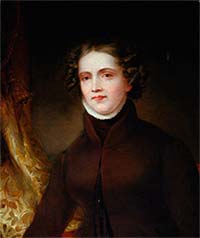Local History Society Report
Anne Lister: the life and loves of a local landowner
Speaker:Christine Booth
Monday, 19 November 2018
 With the newly filmed story of Anne Lister about to launch on TV, it was an appropriate time for Hebden Bridge Local History Society to hear something of her story from a long serving volunteer at Shibden Hall whose talking tours bring its most famous resident to life.
With the newly filmed story of Anne Lister about to launch on TV, it was an appropriate time for Hebden Bridge Local History Society to hear something of her story from a long serving volunteer at Shibden Hall whose talking tours bring its most famous resident to life.
Christine Booth spoke with enthusiasm and insight of the woman whose nickname, Gentleman Jack, signified her role as a grudgingly respected outsider in early 19th century Halifax.
The young Anne Lister seems to have been a spirited child, the daughter of a soldier, who enjoyed an adventurous outdoor life but was also keen to gain an education. After school she was motivated to learn Greek, Latin, Hebrew and French and to learn to play the flute and the harpsicord. She also, to the benefit of posterity, kept the famous diaries and letters some of which have been made available to those interested in her life by the transcriptions of Helena Whitbread.
Anne made the most of her family connections, arriving at Shibden Hall in 1815, aged 24, to help her aunt and uncle. Perhaps at first she was almost in the role of poor relation, but also presumptive heiress. Shibden was a large estate with many tenant farms, coal mines and stone quarries, and Anne's involvement must have sharpened her skills as a manager and business woman, fitting her independent character as her relatives relied on her more and more.
Anne's time at school in York seems provided her with the first romantic lesbian encounter, with a 'girl of colour' called Eliza Raine. She refers to herself as 'Eliza's husband' and as one who 'loved the fairer sex'. She later met and fell in love with another fellow pupil Mariana Belcombe, but Mariana didn't have the luxury of independence and was persuaded to marry a much older wealthy man, hoping that he wouldn't live too long. The love affair continued for a while after the marriage, and their meetings are recorded in the code that Anne adopted in order maintain secrecy. She records other sexual encounters, but none that replaced the lost relationship with Mariana.
It seems that Anne was aware of and accepted what she deemed her 'oddity' and the independence of her position as an heiress allowed her to live the life she preferred. Meanwhile the figure of 'gentleman Jack' emerged, marked out by her choice of dress– always black, sometimes a skirt, but often waistcoats and gentlemen's breeches. She must have commanded respect as well as the derision suggested by her nickname for she was a formidable and competitive business woman, with a keen interest in politics and not afraid to bully her tenant farmers to exercise their vote in the way she preferred, despite there being no woman's franchise. She had an interest in the innovations of the age, investing in rail and canal projects, and selling off land for new roads. In Halifax she bought Northgate House which she operated as a hotel and 'casino' or club. She also undertook extensive alterations to Shibden Hall.
Her great love was travel, and her aunt was often her companion: they spent months living in Paris and travelled widely in Britain, especially to wild places like the Lake District. Anne was a walker and climber, and is still remembered in France as the first woman to climb Monte Perdido in the Pyrenees and as the first tourist to conquer the Vignemale.
The most famous and lasting romantic relationship she had was with Ann Walker, another heiress of a local family. Ann Walker seems to have been less at ease with her sexual identity, and prone to anxiety and other illnesses. Eventually she was persuaded to move into Shibden Hall with Anne Lister; they exchanged rings and went through a form of marriage, when they shared the sacrament at Holy Trinity Church, Goodramgate in York in 1834.
The foreign travel intensified, with more adventures and more far flung destinations including Moscow, where Anne records flying down the frozen Volga in a coach whose wheels had been replaced with runners. But it was on this trip in 1840 that Anne suddenly died, probably from an illness caused by a tick bite, and Ann Walker was responsible for bringing her body back home to Halifax, a journey that took from September to April
Unsurprisingly, Ann fell into severe mental illness after this trauma, and was taken into an asylum in York, where she survived for another 15 years.
Christine's story of the 'local lady' was packed with incident, and she could obviously have talked for as long again about the complex and fascinating life of Anne Lister.
The next meeting of Hebden Bridge Local History Society, on Wednesday 28th November, will hear Andrew Bibby talk about the story of the fustian co-operative at Nutclough mill. Meetings are held at Hebden Bridge Methodist Church at 7.30. Everyone welcome.
With thanks to Sheila Graham for this report
Details of all the Society’s activities can be found on the website and you can also follow them on their Facebook page.
See also
The first few episodes of Gentleman Jack (screenplay: Sally Wainwright) were inspired by two books written by local historian Jill Liddington, including Nature's Domain published by Pennine Pens


